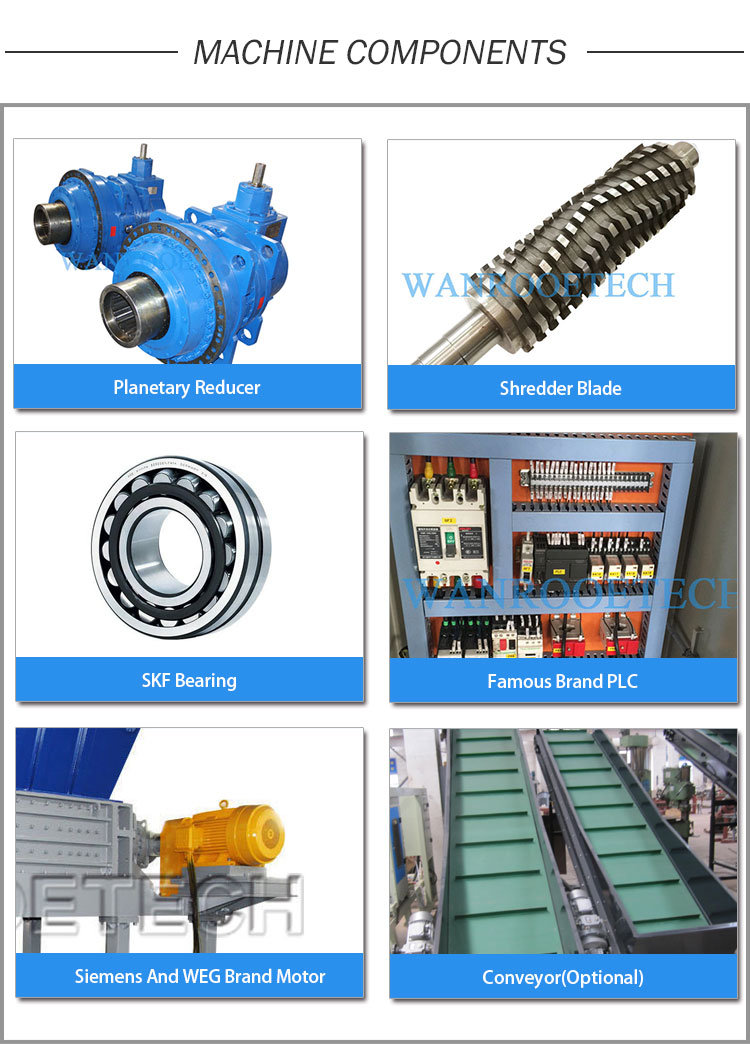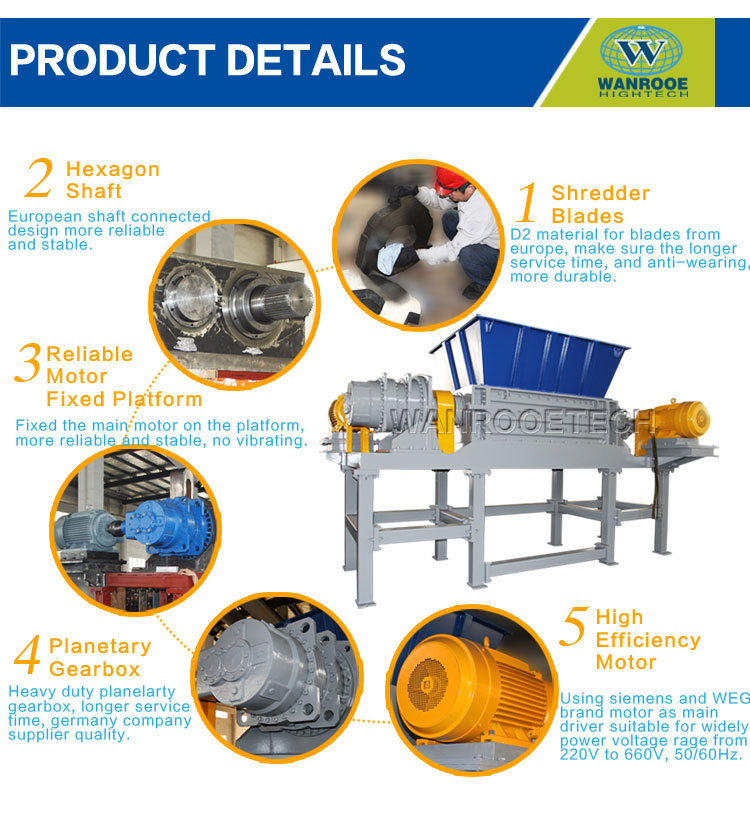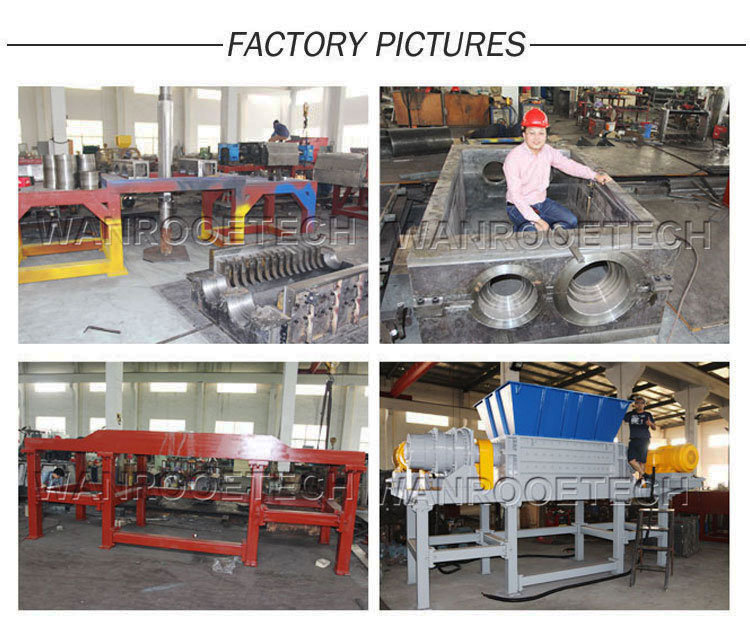Double Shaft Plastic Recycling Shredder for Metal, Wood, Paper, and Tire
Description:
The Double Shaft Shredder is equipped with high-quality cutters and operates at a low rotational speed, reducing energy consumption and noise. It features two counter-rotating shafts that intermesh, each fitted with sharp disks and hooks designed to grip and shred materials effectively. The powerful tearing action of the cutting discs ensures efficient processing of various materials. The specially designed rotor enhances wear resistance, making it ideal for heavy-duty applications.
Double Shaft Shredder Blades (Available in Different Types Based on Material):

Components:

Technical Features:
- Can be used as primary or secondary shredders in waste management, biofuel production, and more.
- Slow-speed, high-torque design with hardened steel cutters for durability.
- Powerful rotors can handle large hard plastics, heavy tires, and other tough materials.
- Capable of processing a wide range of materials, including metals, wood, plastic, and rubber.
- Robust construction with high-thickness frames and tubular structures for long-lasting performance.
- Blades are available in various quantities, qualities, and shapes to suit different needs.
- Equipped with PLC control to detect overloads and reverse the shafts to clear foreign objects.
- Safe and simple cutter removal and replacement process.
- Uses a planetary reducer for higher efficiency, stability, and torque density.
- Optional cooling system for continuous operation.
Application Areas:
This shredder is ideal for pre-crushing various materials such as:
- Plastic sheets
- Electronic waste
- Scrap (components, subassemblies, consumables)
- Metal (lead, aluminum, copper, cables, barrels, sheet scrap)
- Aluminum cans
- Wood (pallets, fruit boxes)
- Plastic bottles, canisters
- Waste tires, rubber
- Household appliances
- Paper waste (cardboard, newspapers, books, magazines)
- Textiles (rags, garments, carpets)
- Animal bones and organic waste


Technical Parameters:
| Model | Shredding Motor Power (kW) | Shredding Chamber Size (mm) |
|---|---|---|
| PNSS-300 | 7.5 | 510×300 |
| PNSS-400 | 7.5 | 510×400 |
| PNSS-600 | 7.5+7.5 | 510×600 |
| PNSS-800 | 18.5+18.5 | 600×800 |
| PNSS-1000 | 22+22 | 800×1000 |
| PNSS-1200 | 30+30 | 1000×1200 |
| PNSS-1400 | 55+55 | 1400×1200 |
| PNSS-1600 | 55+55 | 1600×1200 |
| PNSS-1800 | 75+75 | 1800×1400 |
| PNSS-2000 | 90+90 | 2000×1400 |


Stamping Die frame: the perfect combination of manufacturing process and market development
With the rapid development of manufacturing industry, stamping die frame as an important processing tool has been widely used in automotive, aviation, electronics and other fields. This article will introduce the basic concept, design principles, production process, market status and development prospects of stamping die frame in detail to help readers better understand this field.
First, the basic concept of stamping die frame
Stamping die frame is a kind of die frame for stamping processing, which is mainly composed of upper die, lower die, die handle, guide post, guide sleeve and other parts. The role of the stamping die is to ensure the accuracy and stability of the Mold installation, and to facilitate the stamping operation. According to the processing needs, the stamping die frame can be divided into simplex die frame and multi-station die frame.
Second, the design principle of stamping die frame
The design principle of stamping die frame mainly includes reasonable structure, accurate size and high precision. The structural design needs to be optimized according to product requirements and processing equipment to achieve a smooth and efficient stamping process. Dimensional accuracy is strictly required to ensure the stability and service life of the mold. High precision can improve product quality and production efficiency.
Third, the production process of stamping die frame
The production process of stamping die frame includes three links: processing, assembly and inspection. The processing link includes material selection, cutting, grinding and other steps, requiring strict control of errors. The assembly process needs to ensure the precision and stability of each part. The inspection link tests the overall performance of the mold frame to ensure that it meets the requirements of use.
Fourth, the market status of stamping die frame
At present, the market competition is fierce, and price and quality have become the key factors for enterprise competition. Some large mold enterprises have strong R & D capabilities and technical advantages, can provide high-end stamping die products, the price is relatively high. Some small and medium-sized enterprises rely on the low price strategy to provide middle and low-end products. In general, the quality of stamping products on the market is uneven.
Â
Stamping Mould base,Automotive Electromechanical Products,Non-standard Mold Insert processing and manufacturing,Data Cable Interface